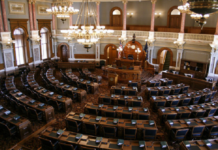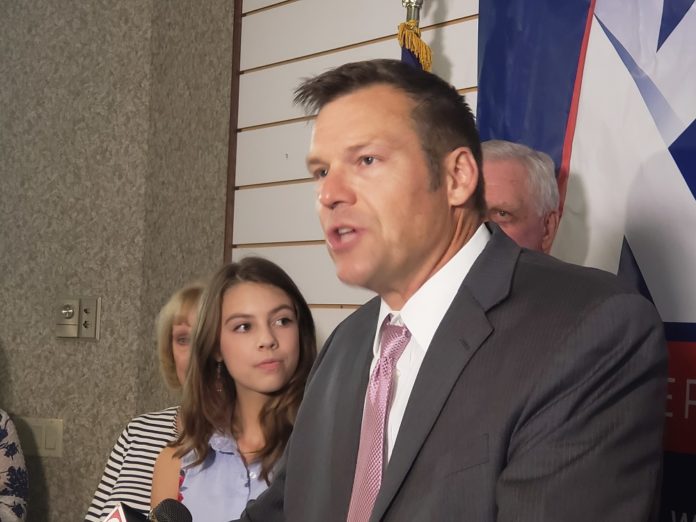As secretary of state, Kris Kobach decided to defend the state’s voter proof-of-citzenship law knowing his office would bear the cost of legal fees that now potentially threaten the agency’s budget after he’s gone, records show.
Kobach decided to take on the case even after the attorney general’s office alerted him to the financial implications of defending the state’s proof-of-citizenship requirement for registering to vote, which the courts have ruled as unconstitutional.
Chief Deputy Attorney General Jeff Chanay put Kobach on notice in 2015 that the secretary of state could personally try the case under certain conditions, including that his office take on all legal fees, according to records obtained under the state’s open records law.
Kobach signed the letter acknowledging the conditions under which he would defend the law, which the courts found imposed an unconstitutional hurdle to the right to vote.
Kobach’s decision — a move he said saved the state money — could prove costly and fiscally disastrous for the secretary of state’s office even now after he’s departed.
Attorneys for the plaintiffs in the case are seeking about $4 million in legal fees, which would eat up most of the office’s proposed $6.9 million budget for fiscal year 2022.
The issue is more complicated since the secretary of state office’s budget comes from fees designated to cover the cost of certain taxpayer services that cannot be redirected elsewhere without the risk of more litigation.
“As an entirely fee-funded agency, any unbudgeted expense has the potential to impact office operations,” said Katie Koupal, spokeswoman for Kansas Secretary of State Scott Schwab.
“We will continue to work with the court and attorney general’s office on determining the final cost of the litigation.”
If the attorney general had represented the case, the attorney fees sought by the American Civil Liberties Union and others would have been paid from the tort claims fund, which is bankrolled by general state tax dollars.
Kobach said his office agreed to take on the case because it would save money.

The decision “saved the state money because the attorney general’s office has limited personnel and the attorney general’s office almost always has to hire private counsel to handle the extra workload,” Kobach said in an interview Thursday.
“My volunteering our attorneys at the secretary of state’s office took a huge workload off the back of the attorney general’s office at the most time-consuming stage of the case — the trial stage,” he said.
Asked if he put the agency’s budget in jeopardy, Kobach said it’s a question of what pot of money the state would pay the fees from.
“The amount of money that the state pays is going to be the same no matter which pot of money it comes from,” he said.
The attorney general’s office said the secretary of state would not be responsible for all $4 million, assuming a judge ultimately awards the full amount — an issue that still stands to be litigated.
The attorney general’s office believes the agency would be responsible for all fees incurred before a district judge struck down the law in 2018.
The state tort claims fund would be responsible for fees incurred after Schwab took office and the case was appealed.
The court records don’t delineate between the two time periods, although the costs for the appeals are likely going to be substantially less than the fees amassed during the trial phase of the case.
Schwab asked Attorney General Derek Schmidt to take over the case after Kobach lost at the district court and ended up being held in contempt of court and ordered to take continuing legal education courses.
The contempt charge ended up costing the state about $20,000 in legal fees.
Kobach had an opportunity under the law to make a “timely request” to the attorney general to provide a legal defense and indemnification in the case, but a request was never made, said John Milburn, spokesman for the attorney general.
“The attorney general’s office at that time contacted the secretary of state’s office to determine whether that was an oversight and was advised it was not,” Milburn said in an email last week.
Chanay sent a letter to Kobach on Oct. 28, 2015, authorizing the secretary of state’s office to handle the case.
The letter said Kobach and attorneys Garrett Roe and Bryan Brown could defend the case assuming the secretary of state’s office would bear the cost of attorney fees, judgments and other litigation expenses.
The attorney general retained the right to direct the defense of the case in the event that the complaint was amended to include the state of Kansas.
Kobach acknowledged the contents of the letter with his signature, the documents show.
“The October 28, 2015, correspondence was executed to memorialize that the office of secretary of state was intentionally handling its own defense in the trial court and knowingly not seeking representation or indemnification from the attorney general in this matter,” Milburn said in an email.
The attorney general’s office and the secretary of state’s office continue to try to find a solution to the potential budget problem, Milburn said.
“The two offices continue to discuss how best to handle this unusual and most unfortunate situation,” he said.
Kobach accused the ACLU of deliberating trying to pile up legal fees.
“The ACLU has a well-established racket when it comes to racking up attorney’s fees,” he said.

“Whenever they draw a judge who they think will go the ACLU’s way, they load up the courtroom with unnecessary extra attorneys who are billing by the hour for every hour they sit in the courtroom,” he said.
“That is what happened in this case.”
Nadine Johnson, executive director of the ACLU of Kansas, said Kobach bears responsibility for the fees in this case.
“Secretary Kobach’s antics in prolonging this litigation, which resulted in repeat sanctions and contempt proceedings speak for themselves,” Johnson said in an email.
“The ACLU’s record of integrity in conducting the case is equally clear: Our lawyers worked to minimize hours worked on the case despite Kobach’s consistent recalcitrance, and even declined to seek fees for a number of attorneys who devoted time to the case.”













